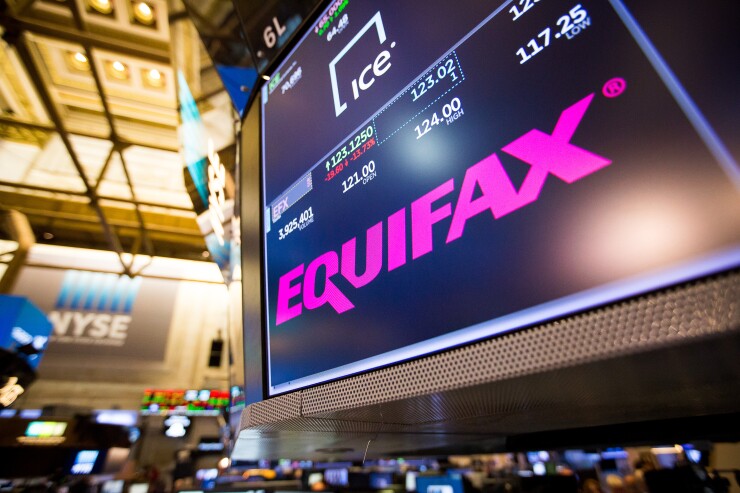Want unlimited access to top ideas and insights?
The information you need to start your day, from PaymentsSource and around the Web:
Bad news for credit bureaus: The massive data breach Equifax disclosed in recent weeks wasn't enough to deter the IRS from awarding it a $7.2 million contract — but a second, smaller incident was. Equifax lost its IRS contract after its website was compromised, directing visitors to a bogus update page for Adobe Flash that was actually set up to distribute malware,

Can smart contracts be democratized? Entrepreneur Reuven Cohen has developed a service to remove some of the complexity behind the smart contracts that underpin transactions for cryptocurrencies. Called CoinLaunch, it's designed to build smart contracts to support Ethereum-based ICO tokens in a few minutes, circumventing the expensive team of blockchain lawyers, accountants and developers that are typically required to build smart contracts, reports
Work from home: Meesho, one of many startups focused on India's "housewife reseller" market, has raised $3.4 million in Series A funding led by SAIF Partners,
What could really hurt the U.K.: It's still unclear how the U.K.'s pending departure from the European Union will harm
From the Web
China Daily | Sat Oct 14, 2017 - The People's Bank of China, China's central bank, has completed trial runs on the algorithms needed for digital currency supply, taking it a step closer to addressing the technological challenges associated with digital currencies, according to a top official associated with the project. Yao Qian, director-general of the Institute of Digital Money at the PBOC, said China's central bank has successfully designed a prototype that can regulate the supply of its future digital fiat currency. The successful simulation of money supply paves the way for the central bank to become the future sole regulator and policymaker governing the value of digital fiat currency, said Yao. Digital fiat currencies are the digital forms of a sovereign currency that is backed by the central bank. Unlike Bitcoin or other digital money issued by the private sector, the digital fiat currency has the same legal status as the Chinese yuan, the only fiat currency issued by the People's Bank of China. There is no timetable for the introduction of the currency, but once introduced, China is likely to become the first country that would deploy a digital fiat currency.
CNBC | Fri Oct 13, 2017 - Congressman Patrick McHenry wants credit bureaus to stop using Social Security numbers. McHenry introduced a bill that would ban the practice by 2020 in wake of Equifax's massive data breach that exposed millions of Americans' Social Security numbers. The legislation would also create regulations for credit bureaus and credit freezes. McHenry, a Republican from North Carolina, argues Social Security numbers were never intended to be essentially a national identification number. As for what to use instead, McHenry said the private sector can decide. Some possibilities could include blockchain technology, biometrics or personal identification numbers.
The Guardian | Sat Oct 14, 2017 - Approximately £500m worth of the coins are believed to still be in circulation. That is a lot of loose change. But official figures show the value of hard cash in the economy is increasing at a rapid rate. Annual growth in the run-up to last Christmas was the fastest in a decade, and the total value of all banknotes and coins has now surged to almost £83bn. That’s more than £1,200 in cash for every man, woman and child in the UK. Research shows the average person has about £77 in cash in their purse, pocket and at home. However, an increasing number have much more squirrelled away safely. And most of it is in £20 notes, which account for more than half of the total. But this is not a peculiar quirk of the British character. There are mountains of cash around the world – although you would struggle to see them. There were $1.5tn (£1.1tn) of US dollars in circulation last year, an increase of 6% on 2015, with more than a trillion made up of $100 notes. There were €1.1tn (£1tn) of euro notes in circulation in August, up by 6% on a year ago.
More from PaymentsSource
IBM plans to use blockchain technology to power real-time execution for international transfers, joining the push to streamline a traditionally cumbersome payment type.
The bank that can effectively enable a corporate customer to manage its working capital and order-to-pay cycle, pay its employees, and provide analytics and insights to forecast cash flow will win the lion’s share of profits, writes Jessica Cheney, vice president of strategic solutions for Bottomline Technologies.
Cash is resilient, especially during times of crisis or uncertainty. But there are significant efforts to make cash less relevant in areas where it has typically been a mainstay.
The convenience of receiving payments within seconds, with the minimal transaction fees that bitcoin provides, means a lot to a business, writes Mariam Nishanian from Dentacoin.
Fintech solutions to send cross-border payments to unbanked consumers through smartphones are gaining momentum globally, but the volume of remittances going to bank accounts in developing countries is also on the rise, according to Small World Financial Services.





